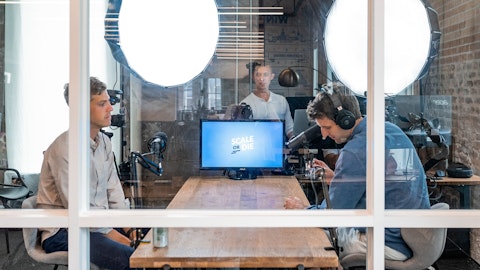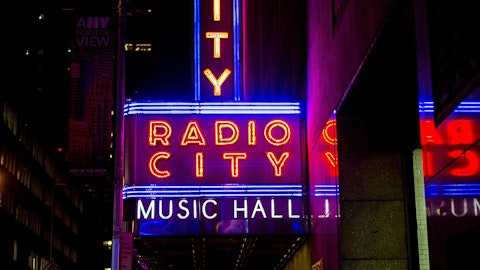Bob Pittman: Sure. Look, at the heart of it, we have this incredible and unique reach we reach 90% of Americans with our AM, FM broadcast business our assets that’s higher than Facebook and Google it’s double more than double the broadcast network TV networks and no one in the digital audio space comes close. So that is a real advantage we have. We reach consumers. And if you go to the fundamentals of marketing, the basics marketing is the more people I can tell my message to, the more business I’ll have because a certain percentage of everyone I tell will turn into a customer. So we know that’s valuable. The problem with broadcast radio has not been the consumer reach, has not been the consumer. It has been how we’re selling our advertising.
And we have — are developing the technology platform, so that the advertisers who are looking for that inventory to look like digital inventory will have the platform that allows that to happen. We think that’s the major benefit to us in broadcast radio. So broadcast radio doing extraordinarily well with the consumer and has a huge upside opportunity in our mind for advertising sales because of one, that reach and two, our ability to serve that reach as Rich talked earlier, being able to provide that same kind of reach to specific cohorts, not just Nielsen audiences.
Jim Goss: Okay, thanks for that. Appreciate it.
Operator: Your next question is from a line of Stephen Laszczyk with Goldman Sachs.
Stephen Laszczyk: Hey, great, thank you. Maybe one on political and then one on podcasting. I guess first for Bob, could you talk a little bit more about what you’re seeing in terms of the adoption of political advertising on podcasting? How big of an opportunity do you think it is this year? And is it something you think the campaigns are looking at as incremental or a mix shift within our budget for audio as a whole? And then I also think you called out the opportunity for podcasting and non-English markets. Just curious if you could spend a little time talking about the tech stack and the pieces that you’ve brought together on that side and where you’re at in terms of the supply-demand funnels in those markets and when you think you could start seeing that become a meaningful contributor to revenue for podcasting. Thank you.
Rich Bressler: Well, let me start with political. We think that, of course, the biggest opportunity is probably broadcast radio for political. As TV’s reach has declined, the candidates have to read and the people with issues have to reach the voters and we have the ability to do that. Now the political advertisers look very closely at which cohorts which groups of people and now with the data and analytics we have available, we’re able to serve that need. So we think that helps us substantially with political this year. The other thing to remember is that only 6% of voters say no one influences me. That means 94% of the people are influenced by somebody else, people in their household, their coworkers, people at the gym, religious leaders, et cetera.
So when you’re looking at targeting, and I think they’ve all recognized this, if you target just the voter, you’re not targeting and not reaching the people who are influencing them. The great news about broadcast radio is if they buy a cohort on broadcast radio that’s their target, everybody else basically hears the message as well. So the people are influencing them will have the message and hopefully can influence that voter. So we see that’s very important. You’re right about podcasting. Clearly with the impact of political and podcasting, there is opportunity there. And that probably would be a big growth area for podcasting this year as well.
Bob Pittman: And what was something on podcasting, you want to talk about translation?
Stephen Laszczyk: Oh, the non-English opportunity and podcasting?
Rich Bressler: The non-English one, yes.
Bob Pittman: We have been experimenting. It’s getting better. Not quite to the level we need it to be to say, let’s roll it out. But it’s making fast pace gains in terms of the quality. And we anticipate probably in this year that we’ll get stuff of that quality. How quickly we’ll be able to monetize it and get it out there, I don’t think we have any projections yet, but we’ll know a lot more by probably the next couple of earnings calls.
Rich Bressler: By the way, it is just as a side note, one of the areas when people, when you look at AI that, you know, it really is efficient to use AI to help on that translation. You know, that’s, again, as Bob said, I wouldn’t change your numbers this year for it. It’s not significant, but it is another that would benefit from AI.
Bob Pittman: It is uneconomic to do it manually, because there’s so many episodes, there’s so many podcasts, there’s so many languages, and AI is really the solution.
Stephen Laszczyk: Got it. Thank you both.
Rich Bressler: Well, first of all, on behalf of Bob, myself, and quite frankly, the entire management team and everybody at iHeart, we really appreciate everybody taking the time to listen to the iHeart story. And we’re here for any follow-up questions. Thank you again.
Operator: This conclude today’s conference. Thank you for joining. You may now disconnect your lines.
Follow Iheartmedia Inc. (NASDAQ:IHRT)
Follow Iheartmedia Inc. (NASDAQ:IHRT)
Receive real-time insider trading and news alerts



